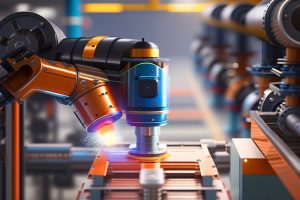There’s Artificial Intelligence, and there’s Augmented Intelligence. Artificial Intelligence is good, but Augmented Intelligence is better. Why? Because Augmented Intelligence is going to change the game for humanity. Artificial Intelligence is a part of it, but on its own, Artificial Intelligence is no match for Artificial Intelligence AND Human Intelligence.
What’s the Deal with Augmented Intelligence?
Alright, so imagine this: Augmented Intelligence is like Batman and Robin working together to fight crime. Except in this case, AI isn’t the bad guy. Instead of replacing humans, AI is here to amplify our abilities.
It’s like having your personal sidekick that can process a ton of information in a flash, while you bring the creativity, empathy, problem-solving skills, culture, psychology, emotions, experiences, sensitivities, ethics and morals to the table.
This is why the mascot for The Synthetic Genius isn’t a lifeless robot. It’s a human wrapped in a machine, with the human being the dominant one as his head is controlling his body that is now made stronger with Artificial Intelligence and robotics in every way possible. Now THAT is Augmented Intelligence.
The Awesome Side of Augmented Intelligence
1. Supercharged Decision-Making
Ever been stuck in a tough spot, not knowing what move to make? Augmented Intelligence swoops in to save the day. Let’s say you’re running a business, and you need to make critical decisions. AI can analyze all the data, market trends, and customer preferences to provide you with insights that’ll make your decisions sharper than ever before. You become a decision-making rockstar.
Example: Jane’s online retail store was struggling to pick the right products for her customers. With Augmented Intelligence, she analyzed customer data, social media trends, and competitor prices to offer the most in-demand products, boosting her sales like never before.
2. Productivity on Steroids
Say goodbye to those mundane, time-consuming tasks that drain your energy. Augmented Intelligence can automate repetitive stuff, like sorting through heaps of emails or organizing data. That means more time to focus on the exciting and creative aspects of your work.
Example: Mark was a marketing guru who loved brainstorming killer ad ideas. However, he spent hours analyzing data and generating reports. With Augmented Intelligence, data analysis was a breeze, freeing up Mark’s time to come up with groundbreaking ad campaigns.
3. Personalized Magic
Remember the feeling of getting a personalized gift that just felt perfect? Augmented Intelligence can bring that magic into everyday experiences. Let’s take healthcare, for instance. AI can analyze your medical history, genetics, and lifestyle to create personalized treatment plans that give you the best chance at a healthier life.
Example: Emily suffered from a chronic illness. With Augmented Intelligence, her doctors tailored a treatment plan specific to her needs, resulting in improved quality of life and a better understanding of her condition.
4. Fueling Scientific Marvels
Augmented Intelligence is like a jetpack for scientific research. Scientists can use AI to sift through mountains of data, analyze complex patterns, and generate hypotheses faster than ever. This turbocharges breakthroughs in fields like medicine, environmental studies, and space exploration.

Example: The team at a space research center used AI to analyze data from deep space probes, leading to the discovery of a new exoplanet with conditions conducive to supporting life.
5. Enhanced Creativity
AI isn’t just about crunching numbers; it can also be your creative muse. Imagine being an artist with access to AI-generated artwork or a musician collaborating with an AI-generated melody. Augmented Intelligence opens up new possibilities for artistic expression.
Example: Sarah, a painter, explored the world of AI-generated art, which inspired her to create a series of paintings that combined her unique style with AI-generated elements, earning her critical acclaim.
Embracing the Inevitable
Let’s face it, Augmented Intelligence is marching forward, and it’s not slowing down. So why not hop on this high-speed train and ride it to a better future? Here are some reasons why Augmented Intelligence is bound to be a part of our lives.
1. The Cool Factor
Who doesn’t love cool tech? People are embracing AI-powered gadgets, apps, and services because they make life easier, fun, and full of possibilities. The thrill of exploring the next-gen AI applications is irresistible.
Example: Jake, a tech enthusiast, couldn’t resist the allure of AI-powered virtual assistants. He got himself one for his home, and now he controls the lights, temperature, and even orders pizza, all with voice commands. It’s like having a sci-fi movie come to life!
2. Working Smarter, Not Harder
Every industry wants to be at the top of its game. Businesses are adopting AI to stay ahead of the competition, make smarter decisions, and serve their customers better. The economy loves this, and the momentum is unstoppable.
Example: Susan runs a small business and was struggling to manage inventory efficiently. With AI-powered inventory management software, she can now predict demand trends accurately, reducing excess stock and avoiding costly shortages. Her business is thriving, and she has more time to focus on growing it.
3. Human Ingenuity Never Sleeps
We humans are curious creatures. We love to innovate, explore, and push boundaries. Augmented Intelligence is the next logical step in our journey of discovery and creativity. We can’t resist making things better, can we?
Example: Peter, an engineer, combined his creativity with AI algorithms to design revolutionary prosthetics. The AI-assisted limbs are more intuitive and responsive, empowering users with a level of mobility they had never experienced before. This innovation has changed the lives of countless individuals with disabilities.
4. Education Revolution
Education is getting an exciting upgrade with Augmented Intelligence. Imagine students having access to personalized learning plans that cater to their individual strengths and weaknesses. AI tutors can adapt to each student’s learning style, making education more engaging and effective.
Example: In a school, AI-powered educational software identified areas where students needed extra help and provided interactive lessons tailored to each student’s learning pace, leading to better academic performance.
5. Smart Healthcare Solutions
Healthcare is experiencing a revolution with AI-driven solutions. From AI-powered medical imaging for faster and accurate diagnoses to wearable devices that monitor patients’ health in real-time, Augmented Intelligence is transforming healthcare.
Example: Sarah, a patient with a heart condition, uses a wearable AI device that continuously monitors her heart rate and alerts her healthcare provider if any abnormality is detected. This early detection system has saved her life on multiple occasions.
6. Sustainable Living
As environmental concerns grow, Augmented Intelligence is playing a crucial role in sustainable living. AI helps optimize energy consumption, manage waste, and design eco-friendly solutions for a greener future.
Example: A smart city implemented AI-powered energy management systems that analyze power consumption patterns and adjust energy usage accordingly. This has significantly reduced energy wastage and contributed to the city’s efforts towards sustainability.
7. Enhanced Travel Experience
Travel and tourism are embracing Augmented Intelligence to enhance the overall experience for travelers. From AI-powered travel recommendations to seamless check-ins at airports, AI is making travel smoother and more enjoyable.
Example: Traveler Alex used an AI-powered travel app that offered personalized itineraries based on his interests and preferences. The app also provided real-time updates on flight delays and gate changes, ensuring a stress-free and memorable trip.
8. Revolutionizing Sports Analytics
Sports teams and athletes are leveraging AI to gain a competitive edge. AI-powered analytics provide insights into player performance, opponent strategies, and injury prevention, revolutionizing the way sports are played and managed.
Example: A football team utilised AI-powered player analytics to identify individual strengths and weaknesses, optimising team formations and strategies for better match outcomes. The team’s improved performance led them to win the championship for the first time in years.
The Flip Side: Ethical Concerns
1. Watch Out for Job Shuffle
With AI automating tasks, there’s a worry that some jobs might be at risk. But hey, remember when ATMs were introduced? People thought they’d replace bank tellers. Turns out, ATMs made banking more efficient, but human tellers found new roles and continued to shine.
Example: In manufacturing, AI-powered robots took over repetitive assembly line tasks, but this led to an increase in demand for skilled technicians who could maintain and optimize the robotic workforce. With proper training and upskilling, workers transitioned to higher-value roles and contributed to increased productivity.
2. Protecting Our Digital Secrets
AI generates loads of data, and we need to safeguard it like treasure. Data privacy and security must be top priorities to keep our personal information safe from the wrong hands.
Example: A financial institution strengthened its cybersecurity protocols by implementing AI-driven threat detection systems. This enhanced protection against cyberattacks, ensuring that customers’ sensitive financial data remained secure from potential hackers.
3. Bias Busting
AI is smart, but it’s not immune to biases. If we’re not careful, AI systems can perpetuate unfairness and discrimination. We need to build AI with diverse and unbiased data to ensure everyone gets a fair shake.
Example: An AI-based language translation tool was found to have gender biases, translating certain professions with gender-specific terms. The developers addressed this issue by incorporating diverse datasets, resulting in more balanced and unbiased translations.
4. Transparency and Explainability
AI systems often operate as “black boxes,” making it challenging to understand how they arrive at certain decisions. Lack of transparency can lead to mistrust and hinder the adoption of AI technologies.
Example: An AI-powered medical diagnosis tool explained its recommendations to doctors by highlighting the key features it considered while making a diagnosis. This transparency helped doctors better understand and trust the AI system’s suggestions.
5. Responsible Use of AI in Defense
In the realm of defense and security, AI’s capabilities can be both beneficial and concerning. Ensuring responsible and ethical use of AI in military applications is vital to prevent unintended consequences.
Example: Military forces equipped with AI-powered autonomous weapons adopted strict protocols to ensure human oversight and control. This measure ensured that decisions regarding the use of lethal force remained in the hands of human operators.
6. Data Privacy in Smart Devices
With the proliferation of AI-powered smart devices in homes and workplaces, the risk of data breaches and privacy violations increases. Proper data protection measures are necessary to maintain user trust.
Example: A smart home device manufacturer implemented end-to-end encryption for data transmitted between their devices and cloud servers. This safeguarded users’ personal data and ensured their privacy remained intact.
7. Impact on Human Connection
As AI interfaces become more prevalent, there’s a concern that human interactions could be compromised, leading to a decline in genuine human connections.
Example: A study found that excessive reliance on AI-powered chatbots for customer service led to reduced customer satisfaction. The company then reestablished a balance by ensuring that human customer support representatives were available for more complex issues, creating a better customer experience.
8. Algorithmic Fairness
Ensuring that AI algorithms treat individuals fairly and equitably, regardless of their demographic characteristics, is essential to avoid discriminatory outcomes.
Example: A credit scoring company modified its AI-driven credit scoring model to eliminate racial and gender biases. The updated model produced more accurate and unbiased credit assessments, providing fair opportunities to borrowers from all backgrounds.
In a Nutshell
Augmented Intelligence is here, and it’s a game-changer. With AI as our trusty sidekick, we’ll make better decisions, boost productivity, unlock personalized experiences, ignite our creativity, and propel humanity to incredible advancements. Sure, we need to be cautious about job shifts, data privacy, bias, overreliance, transparency, and other ethical concerns, but with the right approach, we can ride the AI wave to a brighter, more innovative future.




